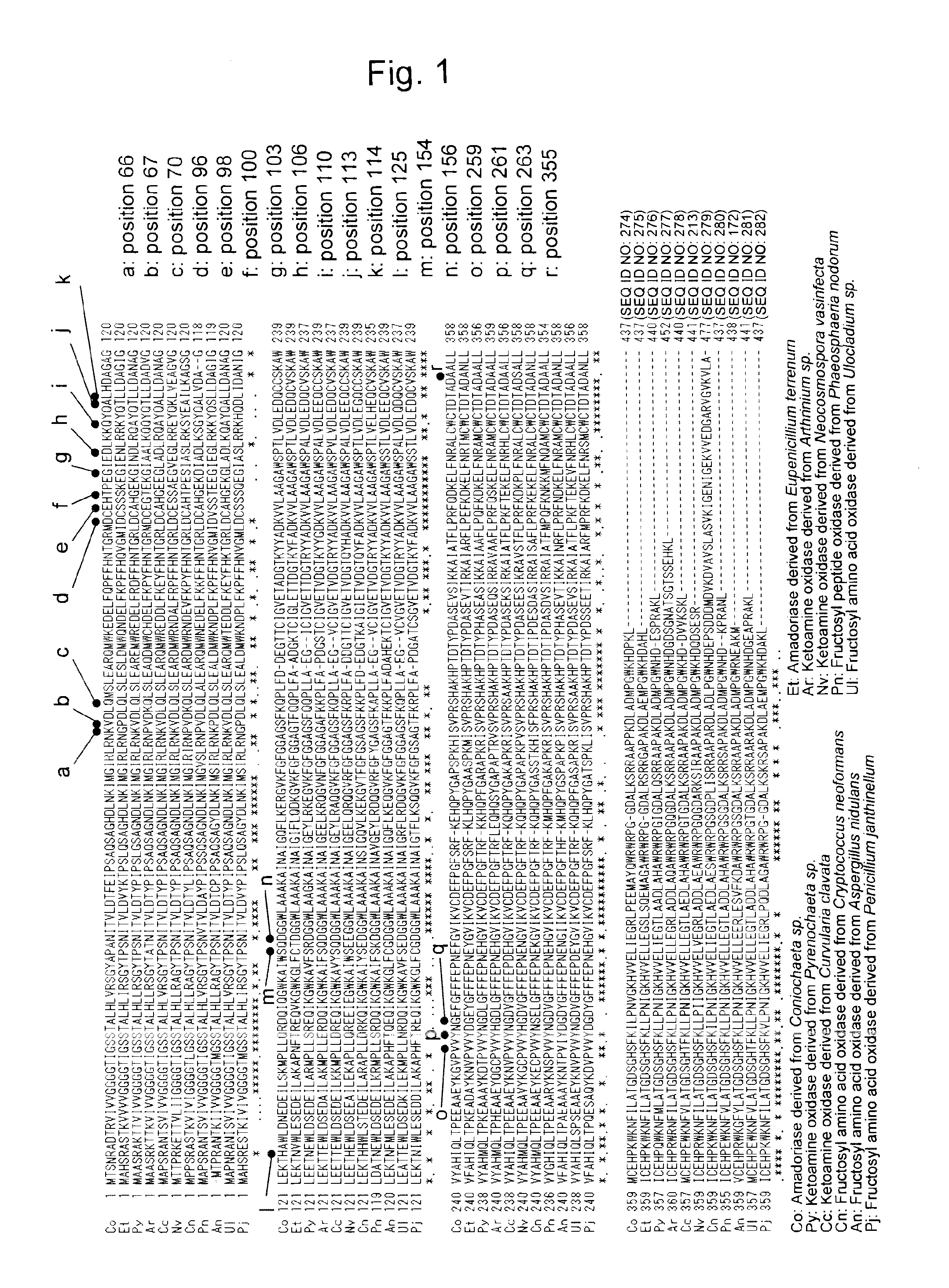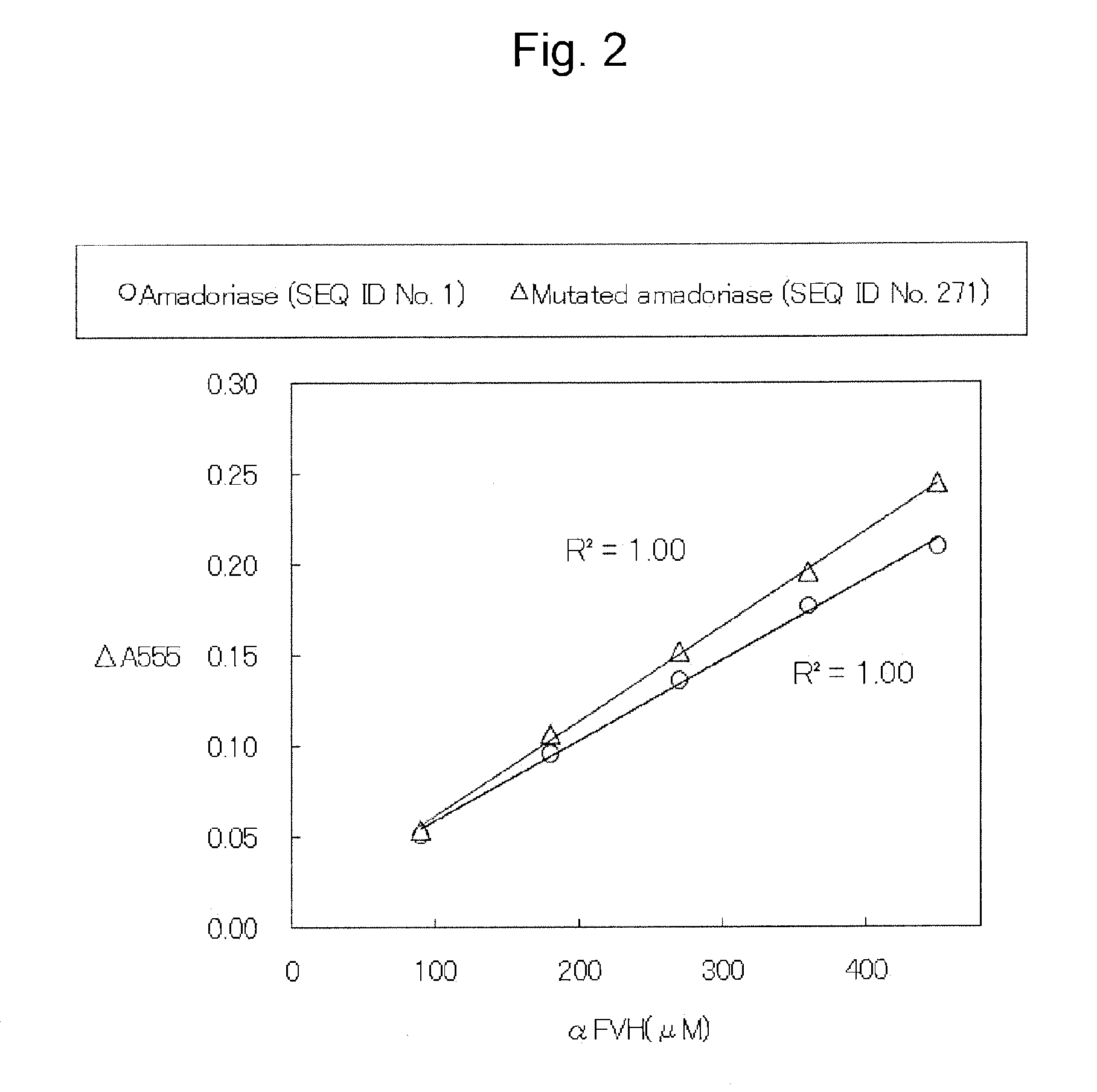Amadoriase having altered substrate specificity
a technology of amadoriase and specificity, which is applied in the field of amadoriase having altered substrate specificity, can solve the problems of reduced difficult to conclude, and inability to say that the reactivity of most known amadoriase with -fk is sufficiently low, and achieves excellent substrate specificity
- Summary
- Abstract
- Description
- Claims
- Application Information
AI Technical Summary
Benefits of technology
Problems solved by technology
Method used
Image
Examples
example 1
(1) Preparation of DNA of Recombinant Plasmid pKK223-3-CFP-T7
[0219]A strain of E. coli 1M109 (pKK223-3-CFP-T7) having the recombinant plasmid of an amadoriase gene (SEQ ID NO: 2) derived from the genus Coniochaeta (see WO 2007 / 125779) was inoculated into 3 ml of LB-amp media (1% (w / v) bactotrypton, 0.5% (w / v) peptone, 0.5% (w / v) NaCl, and 50 μg / ml ampicillin) and shake culture was conducted at 37° C. for 16 hours to obtain a culture product.
[0220]The culture product was centrifuged at 10,000×g for 1 minute to collect strains. A recombinant plasmid pKK223-3-CFP-T7 was extracted and purified therefrom using the GenElute Plasmid Mini-Prep Kit (manufactured by Sigma-Aldrich Corporation), and 2.5 μg of DNA of the recombinant plasmid pKK223-3-CFP-T7 was obtained.
(2) Site-Directed Modification Operation of DNA Recombinant Plasmid pKK223-3-CFP-T7
[0221]PCR was carried out under conditions described below using DNA of the recombinant plasmid pKK223-3-CFP-T7 as a template, synthetic oligonucle...
example 2
Test for Point Mutation of Aspartic Acid at Position 96
[0247]Aspartic acid at position 96 in the amino acid sequence as shown in SEQ ID NO: 1 having high potentials for improving substrate specificity was substituted with another amino acid in an attempt to search for a modified amadoriase having excellent substrate specificity. Under the conditions as described in (2) above, PCR was carried out using DNA of the recombinant plasmid pKK223-3-CFP-T7 as a template, the synthetic oligonucleotides shown in Table 2 (SEQ ID NOs: 41 to 46), and KOD-Plus-(Toyobo Co., Ltd.), E. coli JM109 strains were transformed, and the nucleotide sequences of DNAs encoding amadoriases in plasmid DNAs of the grown colonies were determined. As a result, E. coli JM109 strains producing modified amadoriases resulting from substitution of aspartic acid at position 96 in the amino acid sequence as shown in SEQ ID NO: 1 with any of various types of amino acids were obtained.
[0248]The E. coli JM109 strains capable...
example 3
Test for Point Mutation of Glutamic Acid at Position 98
[0251]Glutamic acid at position 98 in the amino acid sequence as shown in SEQ ID NO: 1 having high potentials for improving substrate specificity was substituted with another amino acid in an attempt to search for a modified amadoriase having excellent substrate specificity. Under the conditions as described in (2) above, PCR was carried out using DNA of the recombinant plasmid pKK223-3-CFP-T7 as a template, the synthetic oligonucleotides shown in Table 3 (SEQ ID NOs: 47 to 82), and KOD-Plus-(Toyobo Co., Ltd.), E. coli JM109 strains were transformed, and the nucleotide sequences of DNAs encoding amadoriases in plasmid DNAs of the grown colonies were determined. As a result, E. coli JM109 strains producing modified amadoriases resulting from substitution of glutamic acid at position 98 in the amino acid sequence as shown in SEQ ID NO: 1 with any of various types of amino acids were obtained.
[0252]The E. coli JM109 strains capable...
PUM
| Property | Measurement | Unit |
|---|---|---|
| Mass | aaaaa | aaaaa |
| Mass | aaaaa | aaaaa |
| Mass | aaaaa | aaaaa |
Abstract
Description
Claims
Application Information
 Login to View More
Login to View More - R&D
- Intellectual Property
- Life Sciences
- Materials
- Tech Scout
- Unparalleled Data Quality
- Higher Quality Content
- 60% Fewer Hallucinations
Browse by: Latest US Patents, China's latest patents, Technical Efficacy Thesaurus, Application Domain, Technology Topic, Popular Technical Reports.
© 2025 PatSnap. All rights reserved.Legal|Privacy policy|Modern Slavery Act Transparency Statement|Sitemap|About US| Contact US: help@patsnap.com


